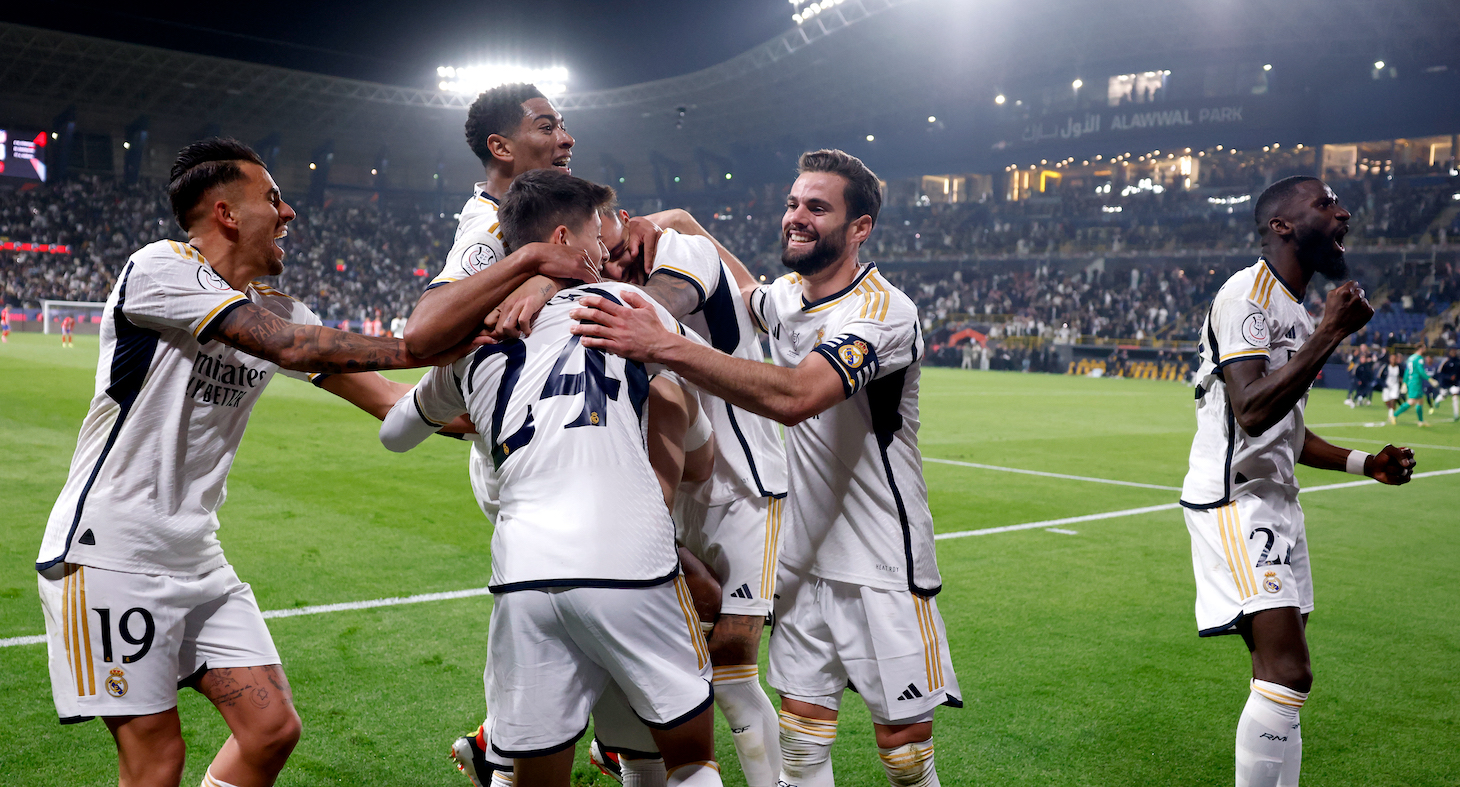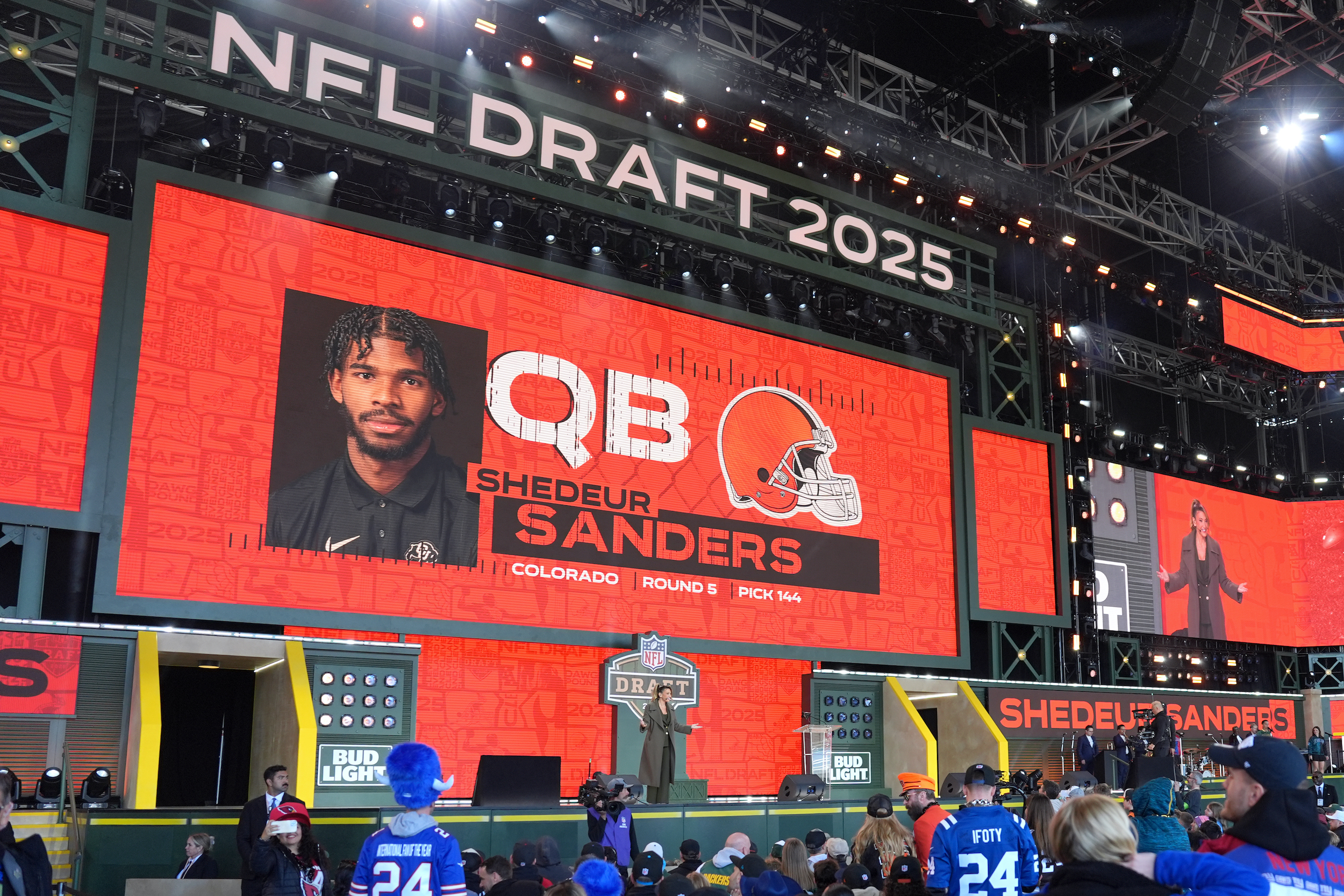Wednesday's Spanish Supercopa semifinal between Real Madrid and Atlético Madrid had no business being as good as it was. Several factors worked against its potential value as a spectacle. For one it's a Super Cup, which in the best of circumstances are tinpot trophies won in preseason that confer only the most modest modicum of bragging rights. Neutrals have very little reason to care about or even watch these things, and even fans with a vested interest in the outcome know that the one or two hours of mild happiness that accompany the lifting of the dumb little cup are mostly about the relief of not having lost.
The infamously broke boys of Spain have in recent years spritzed their Super Cup with a thin layer of gold spray paint in an effort to wring more money from it, making it a four-team knockout competition, played in the middle of the season, held in Saudi Arabia, soccer's new capital of greed and decadence. So many of the nefarious forces that are eating away at the sport's heart can be found in the Supercopa: the creation of newfangled tournaments nobody asked for; the inflation of an already punishingly overstuffed match calendar; the displacement of domestic matches to sterile atmospheres abroad; the willing complicity in despotic Middle Eastern regimes' efforts to sportswash their appropriately grody public images; the crass financial exploitation of classic rivalries (the express hope of the Supercopa is that each year would feature both a Clásico and a Madrid Derby)—and all of it done with the primary and maybe even sole motivation of making more money.
Nevertheless, Wednesday's semifinal was a legitimately great game. Chintzy derby or not, pitting Real and Atlético against one another is always going to result in a match of serious intensity and verve. This was born out on Wednesday in Riyadh, where, in front of an in-stadium audience overwhelmingly clad in white, the two Madrid teams went to battle.
The Madrid Derby over the past decade has usually been a tight and tetchy affair between one group of creators (the Blancos) and a gang of destroyers (the Rojiblancos). But anyone who's paid attention to La Liga over the past couple years will know that the current Atlético is close to the opposite of the ones manager Diego Simeone made famous. This Atleti loves putting together pretty attacking moves, and has a tissue-thin defense that can't hold up against a sneeze. Real Madrid at present is not too dissimilar, in that it is very much rich with forward-thinking midfielders and almost wholly destitute of hard-nosed defenders, especially after serious injuries took away Éder Militão, Thibaut Courtois, and David Alaba.
The result of this matchup was a fabulously wide-open game replete with fantastic attacking interplays on both sides of the pitch, goals upon goals upon goals, and two defenses completely uninterested in stifling any of the fun the attackers were having. Put more simply: The attacking was great, and the defending was horrendous. Across 120 minutes of play, viewers were treated to eight total goals, four of them scored in the first (and better) half of play. Some of them were beautiful, like the stunningly deft side-footed flick from, of all people, Ferland Mendy, which put Real up 2-1, or Antoine Griezmann's hoodwinking reversal touch that set him up for the strike that leveled the score at 2-2. The vast majority of those goals—seven out of the eight, in fact—were directly attributable to nightmarish defending.
Atlético got things kicked off quickly when, in the sixth minute, Mario Hermoso's uncontested (the match's first glaring defensive error) header off of a corner kick snuck into the side of Blanco keeper Kepa Arrizabalaga's net. Antonio Rüdiger answered back not long after with an uncontested (the second glaring defensive error) header of his own in the 20th minute. That goal swung the momentum of a match that had been going in Atleti's favor, and Mendy put Real in front with his aforementioned stunner of a touch nine minutes later. About 10 minutes after that, it was Atlético's turn to wow the crowd, when Griezmann capped some neat associative play between himself and Rodrigo De Paul (God, the things that duo can come up with when they collaborate) with a goal. (Grizi's turn was great, but Kepa really should've saved what was hardly an unstoppable shot, making it the third glaring defensive error of the match.)
Griezmann's strike, and the 2-2 scoreline it effectuated, closed the scoring of the breakneck first half. The rest of the match couldn't quite match the first 45 minutes for entertainment, but it did have its share of intrigue. The second half was also open, though Atleti did gradually start to slow things down, both out of evident fatigue and also to protect the lead the Rojiblancos nabbed when yet another Kepa boner (the fourth goal-costing defensive error) put them ahead in the 78th minute. Five minutes from the end of regulation, a simple lumped ball down Vinícius's wing saw the Brazilian sprint all the way through a criminally disjointed Atleti defensive line (the fifth glaring defensive error), where Atleti kept out one Vini shot and two Jude Bellingham attempts before Dani Carvajal smashed the ball into the roof of the net, tying things back up at three all.
Extra time was where you could finally see the tinpot nature of the Supercopa start to bear out in the teams' decision making. Neither team pushed all that hard for a winner, and both started subbing off major players, no doubt thinking that a Super Cup win wasn't worth an injury that might jeopardize either team's chances in the competitions that actually matter. From second-half stoppage time until the end of extra time, Atleti and Real combined for seven total substitutions, taking off stars like De Paul, Álvaro Morata, Koke, Vini, Rodrygo, and Fede Valverde.
Unsurprisingly, Real's depth proved more effective by the end. Backup striker Joselu scored—"scored"—the decisive goal in the 116th minute when he ran into a gaping chasm between Atlético's center backs (the sixth glaring defensive error) and apparently got just enough head onto a Carvajal cross to flick it onto defender Stefan Savic's leg, which sent the ball bouncing over Jan Oblak's head and into the Atleti goal. Atlético tried to muster what remained of its energy reserves to mount a comeback, but the abandon with which it sent literally everybody forward gifted Real the match-killing goal when Brahim Díaz outraced poor Oblak, who'd gone into attack on a set piece, to a long punt and then shot the ball into an empty net (the seventh and final goal-costing error). It was the eighth goal of the match, which lent the proceedings an air of delirium and joy befitting such a wild and fun game.
A goalfest like this is almost always a blast, but it's important to note that the match wasn't just an exercise in empty entertainment—which is probably the most surprising thing about the entire Supercopa. This semifinal mattered—as does the tournament as a whole. In addition to Osasuna's obvious happiness at even being included in the field, Atlético and Barcelona entered the Supercopa with the most riding on it. Both of those teams have had up-and-down seasons that leave them delicately poised between a great season and a disappointing one. The Supercopa stands as a potential catalyst. A win in the tournament could provide a jolt of confidence and renewed faith, at a critical juncture midway through the campaign, that very well could galvanize the winning team as it seeks to mount a title charge in La Liga and the Champions League. A loss could prove a near-fatal blow to either Atleti's or Barça's chances of righting the ship.
For Real Madrid, currently cruising comfortably through the season despite what could've been a debilitating spat of injuries, the calculus is different. Win or lose, Real could return to Spain pleased about where things are, ready to maintain their favorite status in the league and their perennial place as Champions League contenders. The reward of a Blanco win, then, would be to rob their two big rivals of the potential emotional windfall. By beating Atlético, and with Barça in its sights after the Catalan club beat Osasuna on Thursday, Real is already halfway to its goal.
For better and for worse, this Supercopa says a lot about the state of soccer today. On one hand, the insidious forces of avarice, the ones threatening soccer's established hierarchy both within and outside of Europe, already have their claws deep into the game. This is what makes some of the histrionics surrounding the Saudi league's recent incursions a little over the top. Cristiano Ronaldo and Neymar and Gabri Veiga and the other big-name players signing with Saudi Pro League clubs is hardly some unprecedented leap toward an unforeseen doom; rather, for decades now soccer has been taking countless steps, both large and small, toward the elimination of the sport's regional, cultural, and ethical foundations, such as they ever truly existed outside of idealized abstractions. Things like the Saudi Pro League and the European Super League are only the next logical steps along the same journey.
On the other hand, it's remarkable how soccer still endures. Even swapping Riyadh for Madrid, even in a glorified friendly, even in a game that in concrete terms only exists for money, the Spanish Supercopa has become a meaningful competition capable of producing electrifying matches of real stakes. Atlético clearly wanted to win, Real clearly wanted to prevent that from happening, and both teams tried their damnedest for at least 90 minutes, often to brilliant effect. Griezmann's goal made him Atleti's all-time leading scorer, a deeply affecting feat for the Frenchman personally and a landmark moment in one of the most incredible careers of this generation. The Clásico that awaits in the final is sure to be a must-watch event, with potentially massive ramifications for two of the biggest institutions in sports.
It's not like you could ever really forget where all this came to you from while watching Wednesday's match—not when every Toni Kroos touch triggered an avalanche of boos and whistles from the crowd, surely a response to the German midfielder's resolute statements of distaste for the recent player exodus from Europe to Saudi Arabia. But that's just what soccer is today: a compromised, venal, immoral, deceptive, distressing game that is still somehow able to take your breath away.






